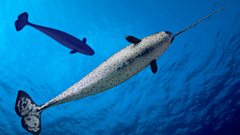Antarctic melt speeds up, Antarctica's future, Cryo-acoustics, Narwhals
Adam Rutherford investigates the news in science and science in the news.
Adam Rutherford goes totally polar this week with news of accelerating ice melt in Antarctica, two visions of the continent's future, and the sounds of collapsing icebergs and the songs of narwhals.
Two hundred billion tonnes of Antarctic ice are now being lost to the ocean every year, pushing up global sea level by 0.6 millimetres a year. This is a three fold increase since 2012. This finding comes from IMBIE, the Ice Sheet Mass Balance Intercomparison Exercise. Leeds glaciologist Andy Shepherd and Durham earth scientist Pippa Whitehouse tell Adam how the project made this startling finding and what it may mean for global sea level rise in the future.
Glaciologist Martin Siegert of Imperial College London has co-authored an unusual Antarctic paper in the journal Nature this week, with other leading south polar researchers. It is a history of the frozen continent, looking back from the year 2070 and charts two different courses that we could be on today.
Satellites above the Antarctic and Arctic can only tell us so much about the melting and collapse of the ice sheets. Oskar Glowacki of the Scripps Institution of Oceanography is exploring what extra insights might come from recording the underwater sounds that ice sheets make when they collapse and melt in Arctic seas.
The narwhal, sometimes known as the unicorn of the sea, is one of the world's most elusive and poorly studied cetaceans, primarily because it spends much of its life underwater and under ice in the Arctic. Marine biologist Susanna Blackwell led a team which used sound recorders and satellite tags attached to several narwhals in Eastern Greenland, to follow their lives continuously for an unprecedented length of time.
Producer: Andrew Luck-Baker.
Last on
Clip
Broadcasts
- Thu 14 Jun 2018 16:3091热爆 Radio 4
- Thu 14 Jun 2018 21:0091热爆 Radio 4
Explore further with The Open University
91热爆 Inside Science is produced in partnership with The Open University.
Podcast
-
![]()
91热爆 Inside Science
A weekly programme looking at the science that's changing our world.



